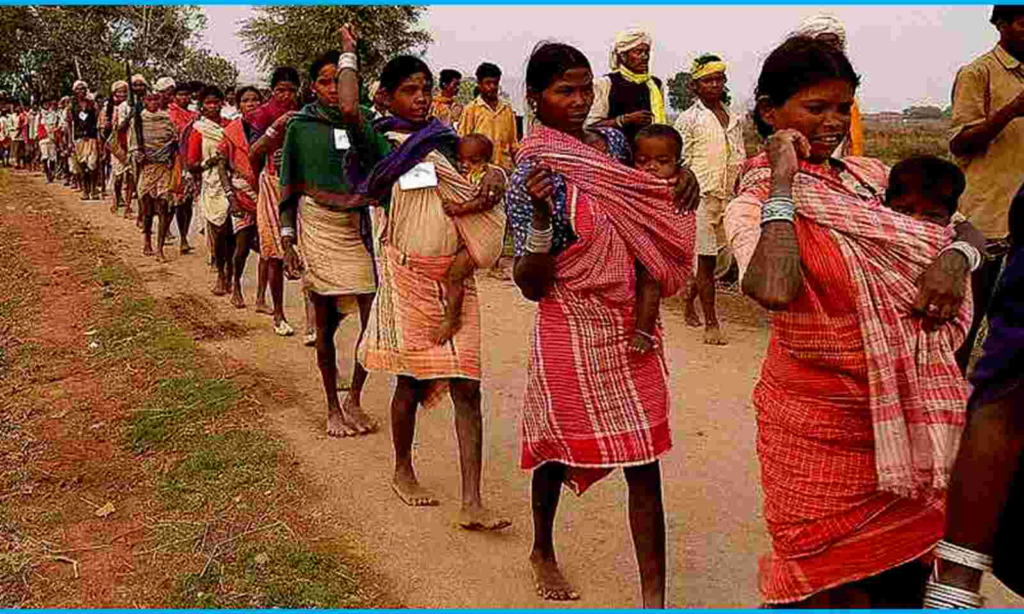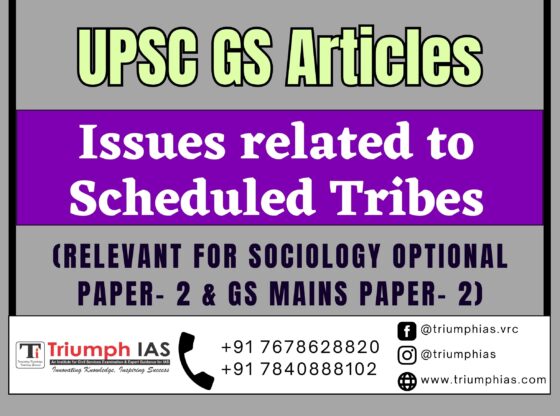Issues related to Scheduled Tribes
Relevant for sociology optional Paper- 2 & GS Mains Paper- 2

Scheduled Tribes (STs) in India are one of the most marginalized and vulnerable sections of society, facing a plethora of issues that hinder their socio-economic development. The Indian Constitution recognizes the need for affirmative action to address the historical injustices and socio-economic backwardness faced by the STs. Despite constitutional safeguards, STs continue to face challenges in accessing basic rights and entitlements. This essay discusses some of the major issues related to STs in India and explores their causes and implications.
One of the most significant challenges faced by STs in India is poverty. Poverty rates among STs are significantly higher than the national average, and they are disproportionately affected by food insecurity, lack of access to clean water, and poor sanitation facilities. According to the National Family Health Survey-4 (2015-16), 45.9% of ST households in rural areas and 34.6% in urban areas lived below the poverty line. The reasons for poverty among STs are complex and multifaceted, including historical discrimination, land alienation, displacement, and lack of access to education and employment opportunities. These factors have resulted in a vicious cycle of poverty and deprivation, perpetuating the marginalization of STs.
Another significant issue faced by STs is the lack of access to education. Despite constitutional guarantees of free and compulsory education for all, STs continue to lag behind other communities in terms of educational attainment. According to the 2011 Census, the literacy rate among STs was only 59.4%, compared to the national average of 73%. The dropout rate among STs is also higher than the national average, with many ST children dropping out of school due to poverty, lack of infrastructure, and discrimination. The lack of education has far-reaching implications for the socio-economic development of STs, limiting their employment opportunities and perpetuating their marginalization.
Health is another area where STs face significant challenges. STs suffer from a range of health issues, including malnutrition, communicable diseases, and non-communicable diseases. The prevalence of malnutrition among ST children is high, with 43% of ST children under the age of five suffering from stunted growth. STs also face significant barriers in accessing healthcare, including a lack of healthcare infrastructure, shortage of healthcare professionals, and discrimination. According to the National Health Profile 2019, there is only one allopathic doctor per 10,926 ST population compared to one per 1,404 non-ST population. The lack of access to healthcare has far-reaching implications for the socio-economic development of STs, affecting their productivity, quality of life, and life expectancy.
Land alienation is another major issue faced by STs in India. STs have historically been dependent on land for their livelihoods and culture, and the alienation of their land has resulted in significant socio-economic and cultural losses. According to the Ministry of Tribal Affairs, STs constitute only 8.6% of the total landowners in India, with the majority of STs being landless or marginal landholders. The reasons for land alienation among STs are multifaceted and include historical injustice, discriminatory land laws, and the lack of legal recognition of their customary rights over land. The alienation of land has resulted in the displacement of STs from their traditional habitats, loss of livelihoods, and cultural dislocation.
STs also face discrimination and exclusion in accessing basic rights and entitlements. Discrimination against STs is pervasive and takes many forms, including social exclusion, economic marginalization, and political discrimination. STs are often subject to stereotypes and prejudices, which result in their exclusion from mainstream society. Discrimination against STs is also reflected in their low representation in public institutions, including the legislature, judiciary, and bureaucracy. According to the National Commission for Scheduled Tribes, there were only 4.5% STs in the Central Government services in 2019. The lack of representation in public institutions has implications for policy formulation and implementation, resulting in policies that do not adequately address the needs and aspirations of STs.
The issue of violence against STs is also a matter of concern. STs are vulnerable to various forms of violence, including caste-based violence, sexual violence, and police brutality. According to the National Crime Records Bureau, crimes against STs have increased by 26% between 2016 and 2019. ST women are particularly vulnerable to violence, with cases of sexual violence and trafficking being reported from various parts of the country. The issue of violence against STs is often linked to their socio-economic marginalization and discrimination, and the lack of effective legal remedies and justice for the victims further exacerbates the problem.
The development of infrastructure in tribal areas is another significant issue faced by STs. Tribal areas have historically been neglected in terms of infrastructure development, resulting in a lack of basic amenities such as roads, electricity, and communication facilities. This has hindered the socio-economic development of tribal areas, limiting their access to education, healthcare, and employment opportunities. The lack of infrastructure has also resulted in the isolation of tribal communities, perpetuating their marginalization and exclusion from mainstream society.
In conclusion, STs in India continue to face significant challenges that hinder their socio-economic development and perpetuate their marginalization. The issues discussed in this essay are complex and interlinked, requiring a comprehensive and multi-pronged approach to address them effectively. The government, civil society organizations, and other stakeholders need to work together to ensure that STs have access to basic rights and entitlements, including education, healthcare, and land rights. Policies and programs need to be designed with the participation of STs, taking into account their cultural and social specificities. Efforts need to be made to address discrimination and violence against STs, and to ensure their effective representation in public institutions. The development of infrastructure in tribal areas needs to be prioritized to enable the socio-economic development of STs. Only through such concerted efforts can the issues related to STs in India be effectively addressed, and their socio-economic development and inclusion in mainstream society ensured.
For more such free UPSC notes, Articles, News & Views Join our Telegram Channel. https://t.me/triumphias
Click the link below to see the details about the UPSC – Civils courses offered by Triumph IAS. https://triumphias.com/pages-all-courses.php


